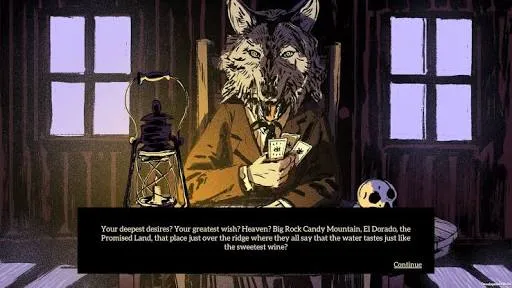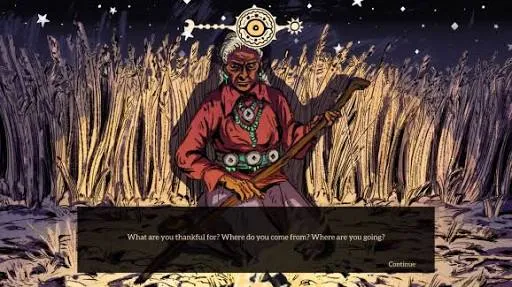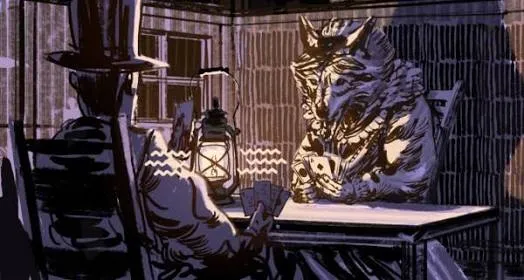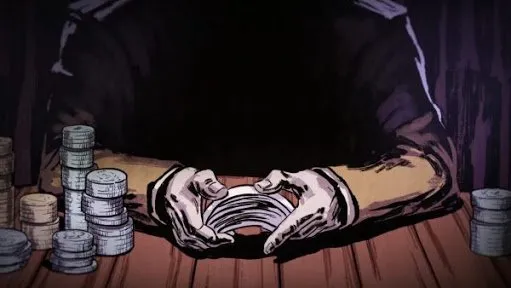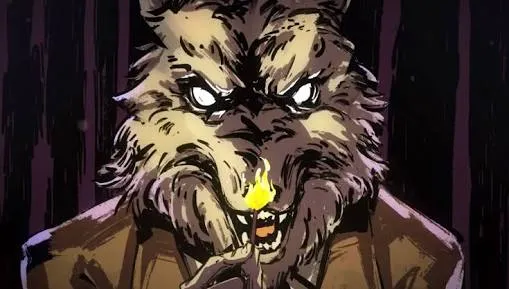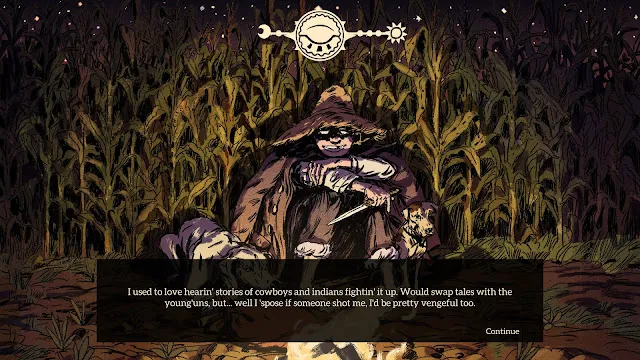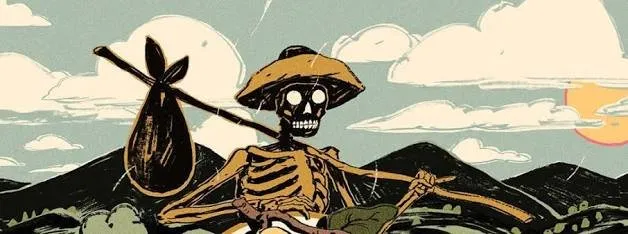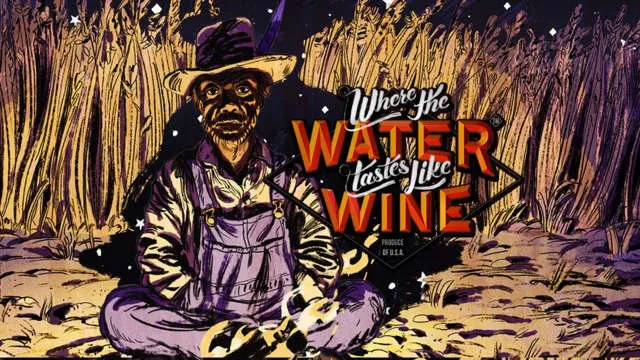
Credits
Recently this week (Feb 28) it arrived on our computers: Where The Water Tastes Like Wine.
This peculiar title of Dim Bulb Games comes after several months of mystery around it. It comes to us after having dropped with the names of some of the people involved in its development: Sting would voice one of it characters, a dozen writers (the likes of Leigh Alexander ) gave their pens to the game and such renowned voices as Melissa Hutchison or Cissy Jones would give life to their characters.
Concept
The proposal of Where The Water Tastes Like Wine is, from its very conception, very risky and never before seen. Dim Bulb Games uses its videogame to move the popular imagery of a whole country; its height, its fall and, especially, its shame. The Great Depression, the communist strikes , the march of veterans of the First World War , the imprisonment of the American Indians or the extreme racism of a nation that for a decade saw its foundations break down and their nation starve. However, they were also years in which the modern and popular concept of American power resurfaced; of that capacity for struggle and entrepreneurship.
Content
The initial premise of Where The Water Tastes Like Wine is nothing more than a gigantic McGuffin (and more considering its end) that serves as a gateway to the studio proposal. In Game we are a vagabond without a name that we have the bad luck to lose a game of cards with a strange anthropomorphic being with a wolf face and a melodious voice.
Our way?
We have to do a little homework ourselves ... By going through the United States to point and collect the stories of our people for lobuno master. And without more we are released in the middle of nowhere in one of the American states without knowing well what we should do.
Little by little this bewilderment, almost as if we woke up in the middle of nowhere, is giving way to the understanding and management of our task. We walk, a bare skeleton with a bundle on a gigantic three-dimensional map of the United States, and a few steps we will see a symbol about a house that catches our attention. We will stop to listen and observe what happens in that house; a couple of women seems to exchange shouts and, perhaps because they do not hear well, some shot with the police. Finally they are arrested and taken to prison. When we ask about their crime we are told that they were two traffickers of illegal alcohol. We shrug our shoulders, pick up our bundle and continue walking. Soon after we will hear another story, and another, and another.
Gameplay
We became, almost without realizing it, in bards of modern times . We travel from one state to another collecting popular knowledge in the form of anecdotes, stories and experiences. Many of them can be the result of chance, others of our imagination, perhaps they are stories of love, adventure, hate, ghosts ... everything is cataloged and organized in our memory because, after all, our work is collect stories and transmit them. Our way of interacting with these stories may also affect their essence . If we decide, for example, to investigate a house that seems enchanted instead of running away from it, history can stop being a terror to be a sad story about an abandoned child.
From time to time our path takes us to meet other travelers ; a kid who has run away from home, a guitarist and African American blues singer in the last, a cowboy who can no longer work because the field is fenced in every day (like the terrible and wonderful novel by McCarthy All the beautiful horses ), a beat poet who flees from the loving rejection of his partner ... These stories are deeper, more intense and are reinforced with each night we spend talking with their protagonists. Are these stories what Lord Wolf wants?
Maybe… cuz We will travel through the United States collecting stories (more than two hundred we have at our disposal) from here and there. Little by little we are getting an idea of that social image that one has of a whole country; his fears, his joys, his stories and folk tales or the germs of some of his greatest legends.
The game of Dim Bulb Games is capable of transmitting the orality of the purest narrative as anyone has ever done before in a videogame . As we travel the country we will find ourselves in situations in which we ourselves hear, through the mouth of another, a story that has happened to ourselves. However, this story has mutated, changed and added different aspects . Little by little, our first story of two alcohol thieves ends up being the story of two of the most famous alcohol smugglers in history that kept the police in check for days. Or that little story of a homosexual couple in a lighthouse derives in a story around a magic beacon that is only lit before the presence of true love. We know that these stories are not real, but we embrace them and accept them without question because we owe it to the emotion of telling stories to the love of the fire.
Objective
Our objective will be to collect as many stories as possible during our journey because these small stories, mutable as we wander, will allow us to investigate more in the past of our fellow travelers. Throughout the United States we will meet characters who, like us, travel and enjoy good stories. Next to the fire we will talk and if we get the stories they want to hear, we will open up to their hearts, until they know their history.
It is these stories that interest our master and collect them all will be our goal. If we succeed with a good story that has also grown over time, we will be closer to earning their trust and hearing pieces of their history. Do not expect to hear the unspeakable secrets of a war veteran with just a couple of jokes. Every night that we manage to earn their trust we will approach them until we reach their true self (literally, their figure will become an allegory of the feelings and fears of our interlocutor). Each of these characters has been written by a different script writer / narrative designer and each one focuses on different aspects of the United States; his military past, his racism, his contempt for socialism, his hunger during the Great Depression, his faith …
Stories to the love of the fire
Where The Water Tastes Like Wine turns narrative into a resource and transforms the mere act of narrating in its management. As we collect stories, and as we grow, we will be managing our repertoire (we can only have three of each type on hand) and we must get to know our fellow travelers to know what they need to hear at all times. It is around this mechanic where part of the magic of the title arises because without giving us accounts we end up reproducing ticks and cliches of our day to day . We all have a handful of stories that we enjoy counting and that we have even garnished with new (and perhaps invented) details. We will always count them because we know they work, we know that they help us connect with the other. This will end up reflected in our stories in front of the bonfire. In my case, one of the fetish stories (in addition to that of my beloved smugglers or the lighthouse of lovers) is the story of two men who are confused by brothers in a city. However, this story ended up mutating into the story of eight identical people born to different mothers who coincide and get confused in a city. Perfect if you want your partner to laugh.
Problem Arises
However, although this effect of management and use of the stories is the central basis of the title, midway through our journey, small problems arise. The collection of stories is relegated to the background when we have a handful of favorite stories (and grown by word of mouth). The stories have, so to speak, three levels of impact: the first time we hear or live, the first time someone tells us a new version of it and the second and final version of the story. Depending on the level of the story we have and if it fits in with the wishes of our interlocutor, we will approach more or less to gain their trust.
This means that when we have a dozen stories at the highest level in the end we care little about collecting more and more stories. The game, to force this collection, makes when we tell a story to a character this story is invalidated for subsequent encounters. Nobody wants to hear the same story for the second time . However, here comes into play a second element that, especially towards the end of our journey, makes everything in Where The Water Tastes Like Wine is too easy and almost will make us lose interest in the process. Every time we come across a character and access that first level of confidence (their stories, like the ones we collect, have three levels, so to speak) we can use them like any other story. The first time that Quinn, the escaped child of the home, tells us the story of his poor family and his dead brother we can use it as a story to talk with any other character.
This is very consistent within the concept of the game itself but it derives in a problem: they are wild cards. The game gives us with each of these stories a blank letter to use if it is the case of not having in our possession a new story to tell a character. Well, during each night we have a limit number of stories to tell, we must choose wisely which anecdote may interest our interlocutor at risk of not earning their trust and having to wait to meet him again. Well, these character stories serve, literally, as wild cards. It does not matter if our interlocutor wants us to tell him a funny story because we can tell him the terrible story of the soldier who came back crippled from the First World War without money but focusing on the funny parts . Or if you wanted a story of adventure in the exciting parts, or sad if you were looking for drama ... This ends up generating a conceptual clash with the game and becomes a carte blanche in the middle of the game. When we have half a dozen stories of completed characters it is very easy to gain the trust of other travelers and we practically will not need to use other stories.
This problem ends up making the essence of the game itself, collect stories and observe how they grow, diluted because we will always have a handful of stories that will make our work easier. While our first sleepless nights with the first travelers are interesting exchanges of anecdotes and we slice our brains thinking what we can say to encourage little Quinn towards the end we do not care what our interlocutor asks us because we have five or six stories that will fit, always, in what they ask.
Game Details
RELEASE DATE: 28 Feb, 2018
DEVELOPERS: Dim Bulb Games , Serenity Forge
PUBLISHER: Good Shepherd Entertainment
GENRE: Adventure, Indie, RPG
SYSTEM REQUIREMENTS
For Windows:
OS: Windows 7, 8, 10
Processor: Intel Core2 Duo E4500 (2 * 2200) or equivalent/AMD Athlon 64 X2 4200+ (2 * 2200) or equivalent
Memory: 1 GB RAM
Graphics: GeForce 8500 GT (512 MB)/Radeon HD 4350 (512 MB)
DirectX: Version 9.0c
Storage: 6 GB available space
For Mac OS X:
OS: Mac OS X 10.8 or Later
Processor: Intel Core 2 Duo or faster
Memory: 1 GB RAM
Graphics: AMD Radeon HD 5750/Nvidia GT 450 or higher
Storage: 6 GB available space
For SteamOS + Linux:
OS: Ubuntu 12.04 or later
Processor: Intel from 1.2 GHz or equivilent AMD family
Memory: 1 GB RAM
Graphics: AMD Radeon HD 5750/Nvidia GT 450 or higher
Storage: 6 GB available space
Conclusion
However, despite this small downturn towards the middle of the game the truth is that Where The Water Tastes Like Wine is the perfect place to revisit if we seek tranquility. Walking through its stage, although somewhat tedious and badly optimized, has something magical. The constant soundtrack, changing depending on the state and part of the country in which we are, ends up being the perfect traveling companion and the voices of our interlocutors are, perfectly, some of the best vocal works of recent years in the field of the video games. The work of Keythe Farley , the narrator, and his way of changing the voice based on the stories he tells may well deserve all the possible prizes and is the perfect accompaniment to the chorus of voices that Dim Bulb Games has gathered.
The artistic work at the time of representing each of the characters and their intimate versions, so to speak, endows Where The Water Tastes Like Wine with a very strong weird and dreamlike atmosphere . Discovering how our travel companions really are as we get deeper into their thoughts and memories helps us to understand the world we travel; always halfway between reality and the story.
Where The Water Tastes Like Wine has a negative point that weighs down the whole lot and seems to be a concession to a certain sector of the public that would tear their clothes in front of a walking simulator game . We must manage, for some reason, the health, money and tiredness of our character even though this does not affect, literally, in any way to any of the important game mechanics since they do not influence our relationship with other characters or our collection of stories. It simply seems to force us to be aware of certain real, tangible resources, and force us to perform some tasks and spend some money. The only real use, for example, of money beyond curing us in health or fatigue (which then does not influence anything else) is the ability to travel by train in a legal way between cities. However, there is the possibility of doing it in the purest American vagabond style (like that storytelling of that chapter of the Simpsons) so the game could have kept its structure completely without any of these resources.
Where The Water Tastes Like Wine is a turn of the screw on the narrative in video games. It works both as a reflection on the medium as a motor of stories and as a self-revision on what the act of telling means for each one of us.
Happy Gaming!!!!
